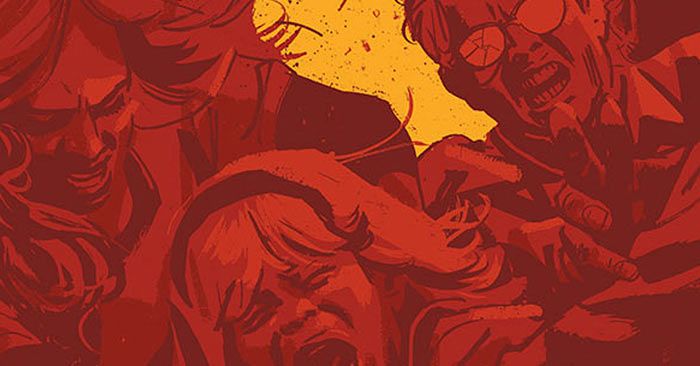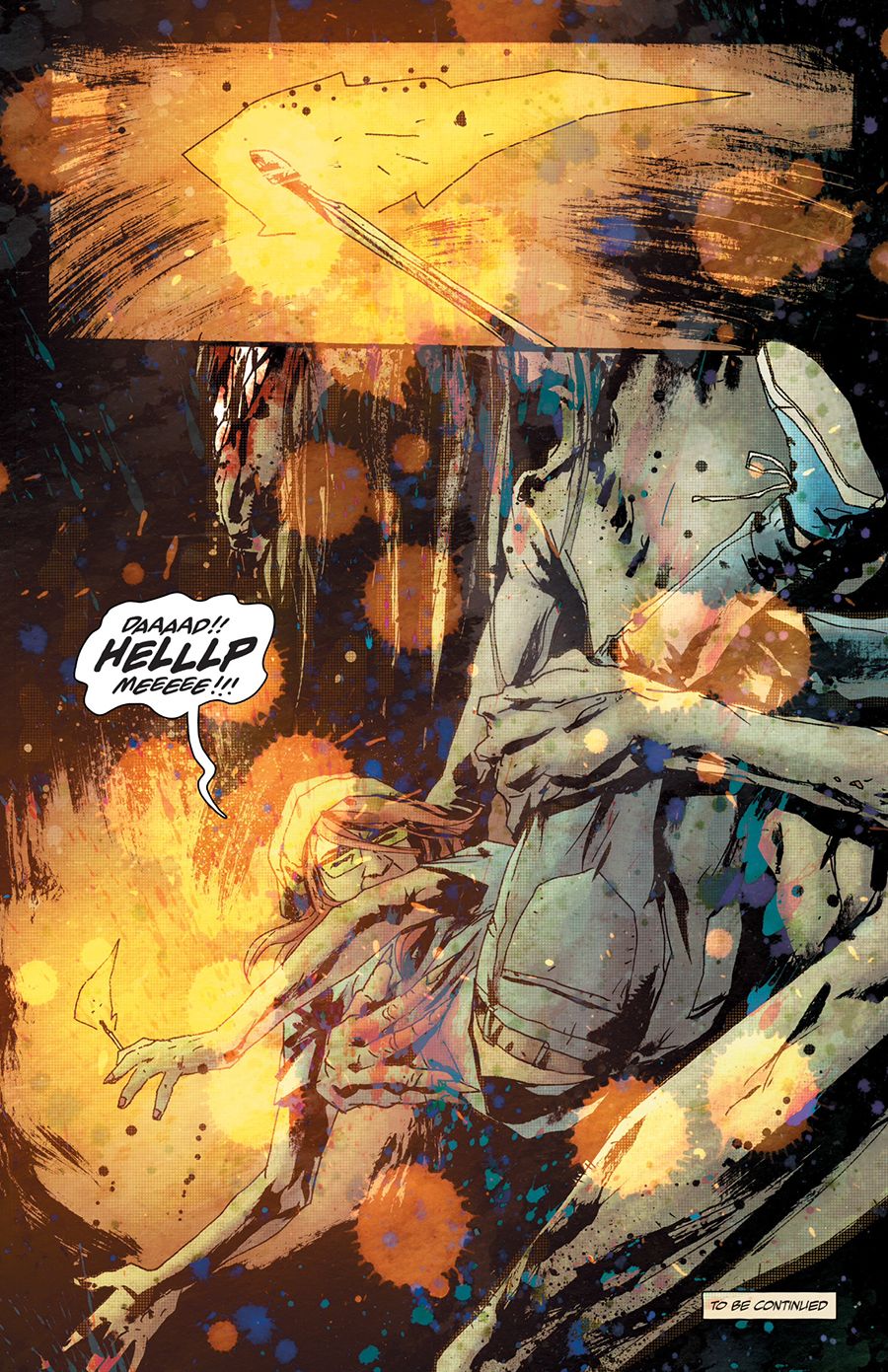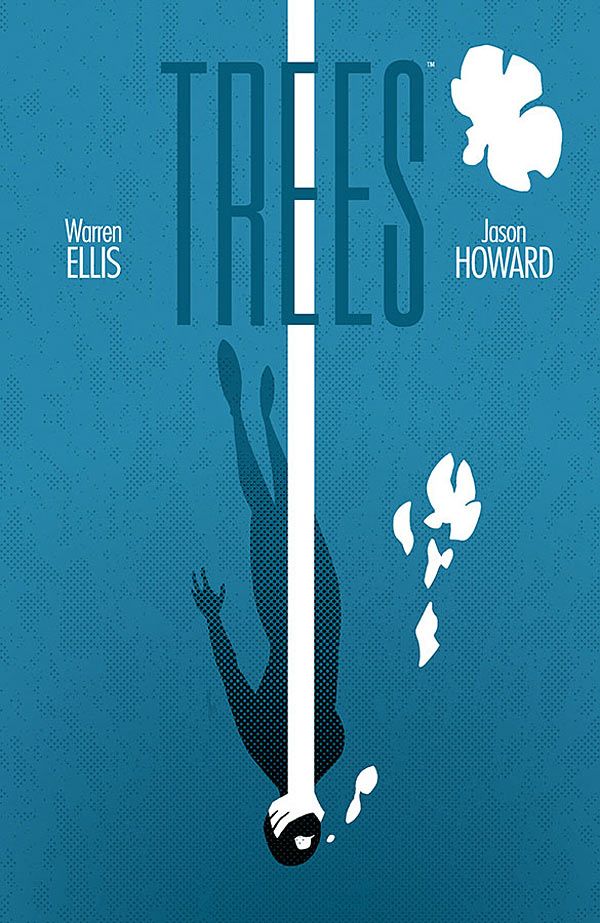Image Comics' final genre-themed panel of C2E2 featured writers and artists of the publishers' horror series coming together to discuss the roots of terror and how they approach their projects. Moderated by David Brothers, the panel featured "Spread" artist Kyle Strahm, "Trees" artist Jason Howard, the "Wytches" team of Scott Snyder and Jock, "Intersect" creator Ray Fawkes, and "Outcast" artist Paul Azaceta.
Brothers began the panel by noting that Howard's current project with Warren Ellis is quite a departure from his last Image series. "'Trees' is the opposite of 'Super Dinosaur,'" Howard joked. He described the story as "the quiet aftermath of an alien invasion." "It's kind of a creepy character drama."
Fawkes spoke next about "Intersect," which he called "a straight from the back of the brain horror story" about people who cannot stop changing shape. "It's a bit of a puzzle book," he added, saying he was interested in "body horror."
Azaceta's "Outcast" came next, which he described as being "about a guy who's plagued by possession" and trying to "figure out why he's being targeted and finding out it may be bigger than him." The series is written and co-created by Robert Kirkman, who has enjoyed some success in the horror genre.
"'Spread' is about a huge organism that has taken over much of the earth," Strahm said, until a baby whose DNA can kill the monsters is discovered. Strahm met writer Justin Jordan at New York Comic Con after reading "Luther Strode," and they quickly decided to work together.
"Wytches," Snyder said, is about "ancient, bestial, cannibalistic creatures who live beneath the earth and have a natural science all their own... But the only way you can get these things from them is to give them someone to eat, it's called pledging.
"I've always loved horror where the monsters are very, very scary ... but the scarier part is the human capacity for evil," Snyder continued. "The Pet Semetary is scary, but it's only scary because we use it." The terror comes in considering that you as a reader could be "pledged," or would pledge someone else. "If your loved one is dying of cancer, is it really so bad to pledge your asshole neighbor?"
"What I like about the series is the human aspect," Jock concurred. "The wytches should represent some slightly out-of-shot evil... I kind of prefer not to draw them, to have them out-of-shot," Jock added, "but when they do show up they've got to be freaky."
Snyder said he joked with the producers of the forthcoming "Wytches" film that he wanted himself and Jock to "play either wytches, or bumbling cops." Then, he realized that he could ask for things along these lines.
Buccellato spoke about his series "Sons of the Devil," which debuts May 27. "I think it's about this darkness inside of you," with the main character Travis worrying that he will become a killer like his father.
Later, Buccellato praised artist Toni Infante, saying he added details that made the story "more scary and visceral" than he'd originally written it.
Snyder said he believes the change of a familiar object into something threatening can often produce genuine fear. "Like the family car that you've always relied on is suddenly the thing coming to kill you," he said.
Azaceta spoke about "micro-panels," and creating "creepy" atmosphere through small moments. Brothers illustrated Azaceta's point with the "evil neighbor" that is only shown in small moments of a story. "[W]hen you see that guy smiling, you know this isn't going to go well."
Brothers noted that all of the horror books featured on the panel deal with families. "What's scary about them is, they're the people we depend on," Fawkes said. "To see that you might not be able to help them or they might not be able to help you can be one of the most terrifying things." Azaceta also noted the potential of the people we love to hurt us.
Fawkes said the text pages in "Intersect" were "meant as a place for the creatures to speak directly to the readers," leaving the actual story contained to the comic pages. The prose is meant to convey the experience of living in this world "from a rather upsetting perspective."
Snyder talked about a neighborhood video shop that "wouldn't rent R-rated movies to kids, but they'd deliver them to your house," allowing him to gravitate to films like "Faces of Death." But the first one to really upset him was "Night of the Living Dead." "The bleakness of that film, the fact that nobody gets out, was unsettling." He also described horror as "a controlled experience" that allowed viewers and readers to "come out the other side, to see there is another side."
Fawkes said horror helped him "work out some things" and tell his readers "if you feel like this, I'm with you," which was an important feeling in his youth.
Snyder said that he has "a lot of trouble reading fiction or watching shows that rely upon a child's death," but "I can write about it all day long." He said this suggested to him that there was an important element of control.
Jock said horror films, or the scarcity thereof, factored in his own sensibilities. In the 1980s, "you couldn't get uncut horror films in the UK... A few years later, eBay comes along, and suddenly you've got access to the uncut Japanese version of 'Cannibal Holocaust.'"
Jock noted the difficulty in true horror in comics comes from the fact that the reader "can stop at any time." Fawkes agreed, saying he tried to craft scenes where readers "don't realize they've been looking at something... That's harder to do in comics."
Howard said "Trees" is a bit of a "slow burn" to let readers get to know the characters, building uncertainty or fear about what may happen as the first volume approaches its conclusion. "Hopefully, in comics, we really have that ability too, so that when something happens that may not be in that character's interest, you feel a connection."
"I was affected when I read the script," Howard said.
Asked whether the writers know how a story ends from the beginning, Fawkes said he never starts writing unless he knows how it concludes. Buccellato noted, though, "The harsh realities of the comic book world, where sales atrophy or go down with each issue, means you might know how you want it to end, but maybe you also have an out point."
Asked about the "Wytches" film, Jock said it's currently out to a screenwriter, and after that there will be further drafts. Snyder added that, whatever happens, releasing the comic is "making something that exists exactly the way you want it."
Asked how they would define horror, Jock said, "I find things that are unsettling much more horrifying that a knife to the head."
"Horror is the dread before and after the scare," Fawkes added.
Discussing monsters with enduring appeal, Snyder reiterated the idea that the things that should be most comforting are the ones best turned to terror. "The idea of your loved one going into the ground and then coming back up to get you is deeply terrifying," Snyder said of vampires. "The reason they endure is that they hit a deep nerve in a lot of people... They speak to things that are eternally frightening."
Asked why the creators gravitated toward telling stories in comics, Fawkes offered, "Comics have an incredible, unique syntax that does not exist in any other art form, and we are still kind of figuring that out."
Buccellato noted the expense of film is prohibitive, but with comics "anybody can do it, you can do it."
"And with Image especially, the only publisher I know of [where] I can tell them things that would be box office poison anywhere else," Fawkes added, using examples of poetry and more. "A lot of other places are like, 'What if people don't get it?' Those chicken shits."



